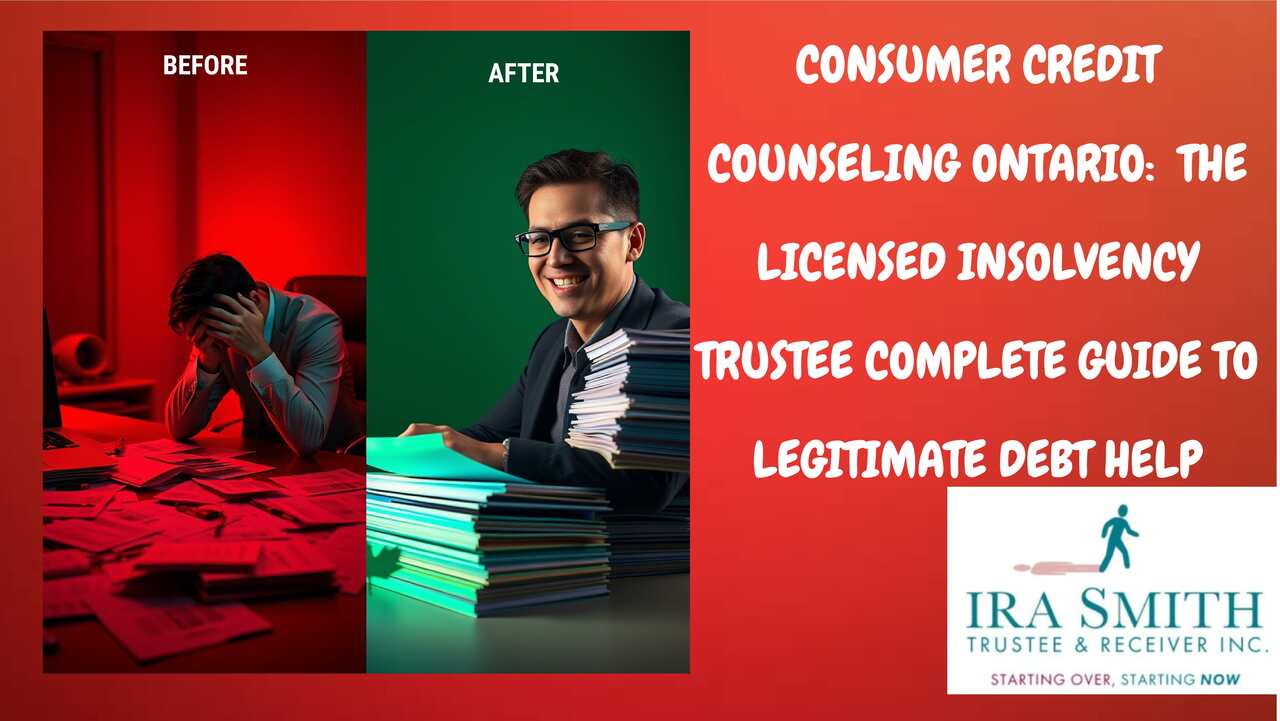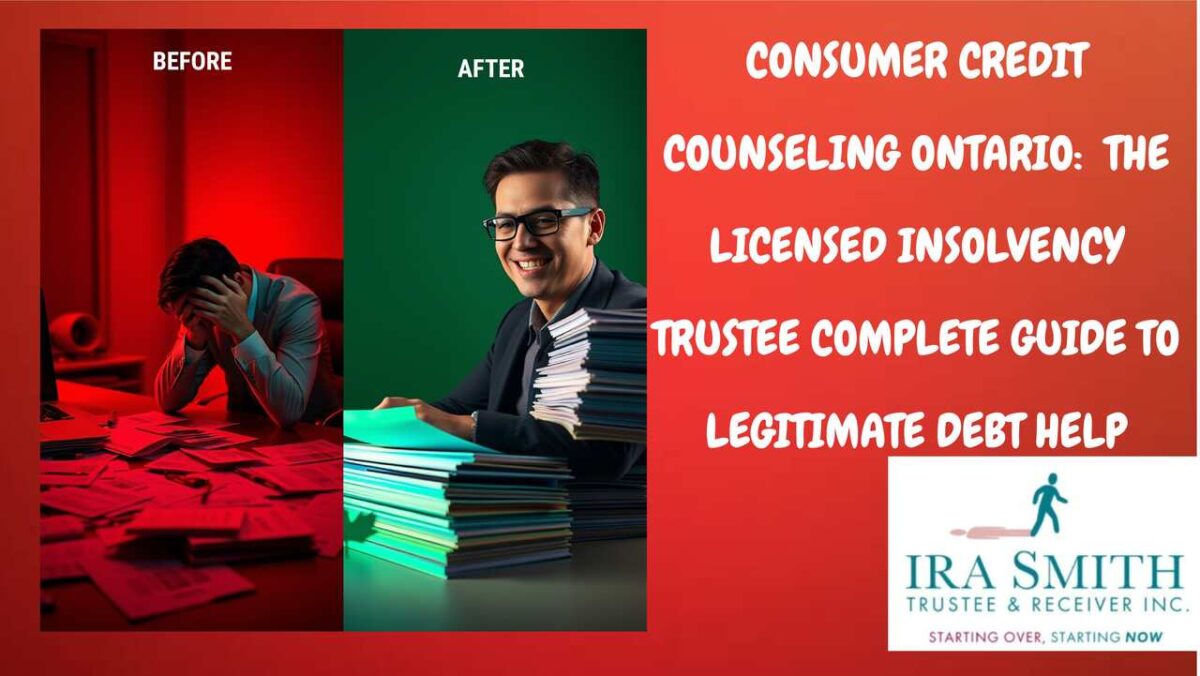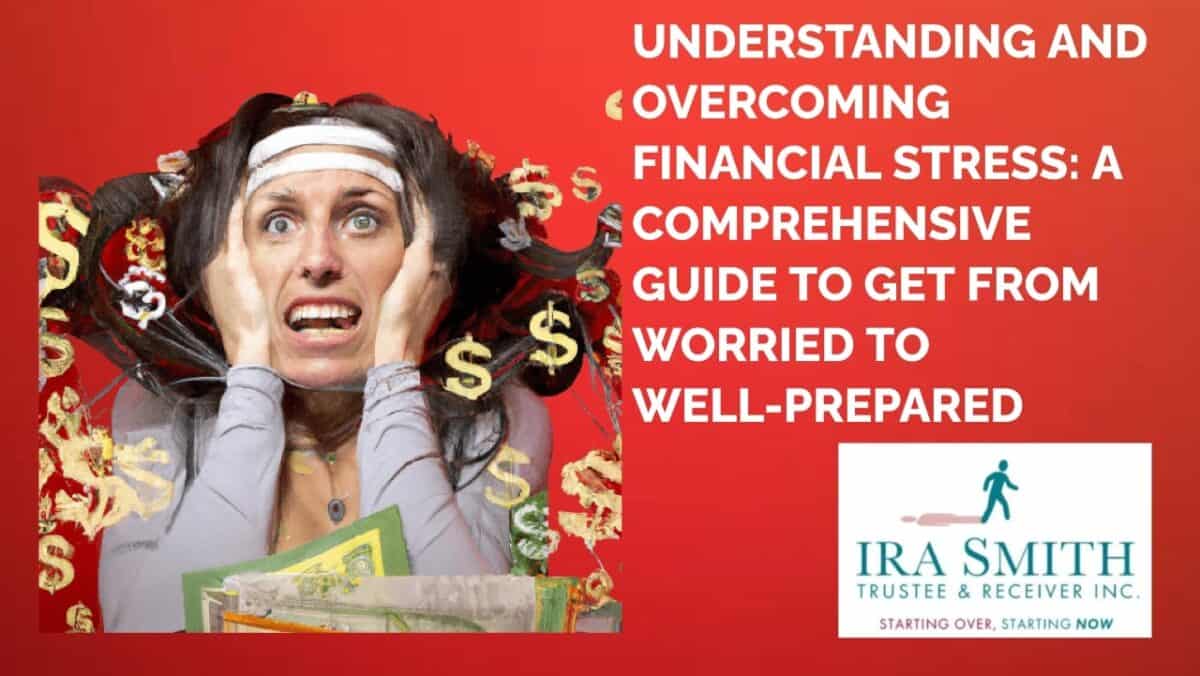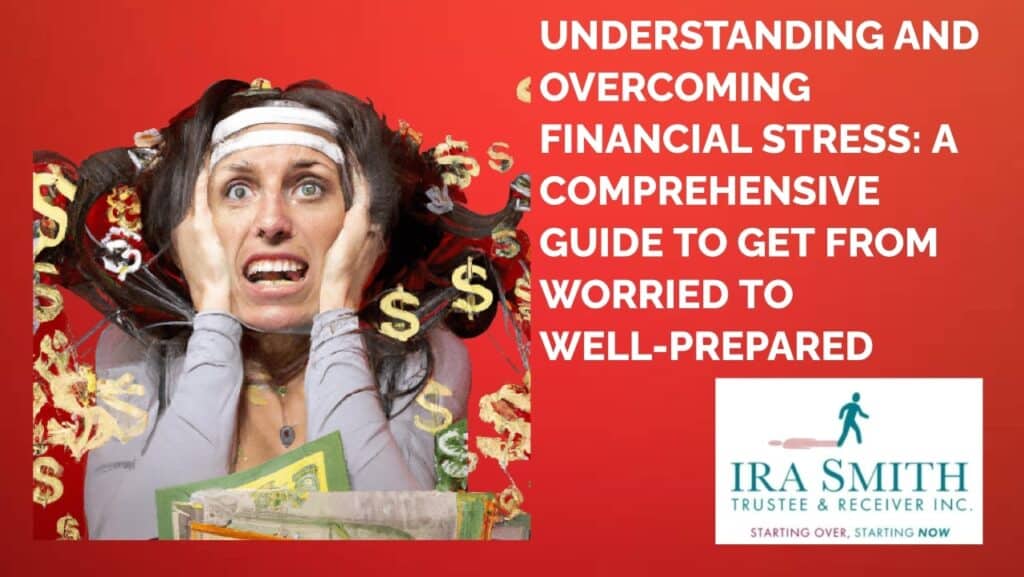Consumer Credit Counseling: Introduction
Are you drowning in debt and don’t know where to turn? You’re not alone. Millions of Canadians struggle with overwhelming debt every year. The good news is that consumer credit counseling can help you get back on track.
But here’s the problem: not all debt advice is created equal. Some companies claim to offer consumer credit counseling, but they might not have your best interests at heart. This guide will help you understand the difference between legitimate help and potentially harmful advice.
What Is Consumer Credit Counseling?
Consumer credit counseling is professional advice that helps you manage your debt and improve your financial situation. A good credit counselor will:
- Review your complete financial distress picture
- Explain all your debt relief options
- Help you create a realistic budget
- Provide ongoing support, education and the opportunity for follow-up sessions after the initial counseling session
- Connect you with appropriate debt solutions
The keyword here is “professional.” Real consumer credit counseling comes from trained, licensed professionals who follow strict rules and ethics.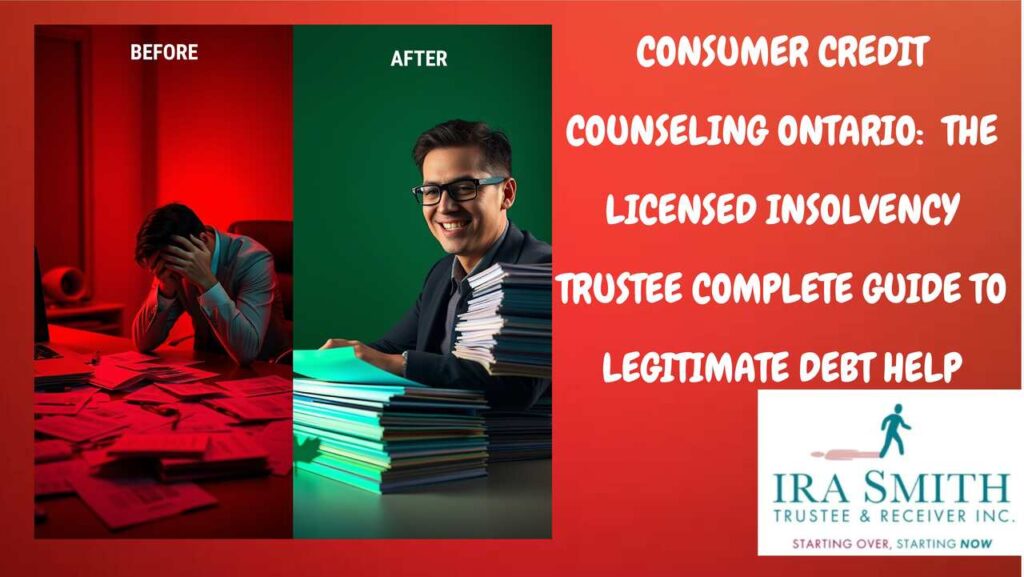
The Hidden Dangers of Unregulated Debt Advisors
Here’s something most people don’t know: anyone can call themselves a “debt advisor” or “credit counselor” in Canada. There are no special licenses required, no training standards, and no limits on what they can charge you.
The Office of the Superintendent of Bankruptcy (OSB) – the government body that oversees debt professionals – has raised serious concerns about this unregulated marketplace. They’ve identified several types of businesses that prey on people struggling with debt:
Debt Advisors: The Middlemen You Don’t Need
These are individuals who work at for profit companies that charge you money to help with bankruptcy or consumer proposals. They often:
- Collect your personal information
- Give you basic debt advice
- Refer you to a Licensed Insolvency Trustee (LIT)
- Charge you thousands of dollars for this “service”
The problem? You can go directly to an LIT for free. You don’t need to pay a middleman.
Lead Generators: Selling Your Information
Lead generators advertise debt relief services online and on social media. When you contact them, they sell your information to LITs for a fee. While they usually don’t charge you directly, they often mislead you about:
- Who they are
- What services do they provide
- Your actual debt relief options
Red Flags: How to Spot Potentially Harmful Debt Advice
The OSB has identified several warning signs that should make you think twice about a debt advisor:
1. They Claim to Be Licensed When They’re Not
Some debt advisors lie and say they’re Licensed Insolvency Trustees or that they can file for bankruptcy for you. This is illegal and can result in criminal charges. Only LITs can legally administer bankruptcies and consumer proposals in Canada. A consumer proposal is the only one of the various debt management programs approved by the Canadian government. Since it is under the provisions of the Bankruptcy and Insolvency Act, you could say that it is the only government program debt solution.
2. They Want Money Upfront
Legitimate consumer credit counseling often starts with a free consultation. Be very suspicious of anyone who demands thousands of dollars upfront, especially if they claim this fee is required to access government debt programs.
3. They Promise Guaranteed Results
No legitimate professional can guarantee specific outcomes. Every person’s financial situation is different. Be wary of claims like:
- “100% approval guaranteed”
- “We can eliminate your debt in 6 months.”
- “Settle your debts for pennies on the dollar.”
4. They Push One Solution
Real consumer credit counseling involves reviewing ALL your options. If someone immediately pushes you toward bankruptcy or a consumer proposal without thoroughly reviewing your situation, that’s a red flag.
5. They Want You to Borrow More Money
Never borrow additional money to pay for debt advice. This will only make your financial situation worse.
The Real Cost of Bad Advice
Working with unregulated debt advisors can hurt you in several ways:
Financial Harm
- You pay for services you could get for free
- You might pay for duplicate services
- Hidden fees can add thousands to your debt
- You might end up in worse financial shape
Missed Opportunities
- You will not get unbiased financial education
- You might not learn about all your debt relief options
- You could choose the wrong solution for your situation
- You might miss out on legitimate programs that could help
Legal Problems
- Some debt advisors engage in illegal practices
- You might unknowingly participate in fraudulent activities
- Your legitimate creditors might not get accurate information about your finances
The International Problem: Lessons from Around the World
The problem with unregulated debt advisors isn’t unique to Canada. Similar issues exist worldwide:
In Singapore, unregulated “debt consultants” charge people $1,000 to $5,000 to help them apply for government debt relief programs. Many people pay these fees only to discover they don’t qualify for the programs. Some firms even encourage people to borrow more money just to pay their consulting fees.
The Singapore government is now proposing laws to make it illegal for these firms to solicit bankruptcy clients, while exempting regulated professionals like lawyers and accountants.
This shows why it’s so important to work only with regulated professionals for consumer credit counseling.
Licensed Insolvency Trustees: Your Best Choice for Consumer Credit Counseling
In Canada, Licensed Insolvency Trustees (LITs) are the gold standard for consumer credit counseling. Here’s why:
They’re Highly Regulated
LITs must:
- Complete extensive education and training
- Pass rigorous examinations
- Maintain ongoing professional development
- Follow a strict code of ethics
- Submit to regular government oversight
They’re Required to Be Honest and Impartial
Unlike debt advisors who might have financial incentives to push certain solutions, LITs must:
- Provide accurate, complete information
- Act in your best interests
- Remain independent from outside influences
- Give you unbiased advice about all your options
They Offer Comprehensive Services
An LIT provides everything you need for consumer credit counseling:
- Free initial consultation
- Complete financial assessment
- Explanation of all debt relief options
- Administration of bankruptcy or consumer proposals if needed
- Ongoing counseling and support
- Regulated, transparent fees
You Can Hold Them Accountable
If you have problems with an LIT, you can file a complaint with the OSB. This government oversight ensures LITs maintain high professional standards.
Your Debt Relief Options: What Real Consumer Credit Counseling Covers
A qualified professional should explain all these options for relief to you:
Non-Insolvency Options
Debt Consolidation: A debt consolidation loan is a way of combining multiple debts into one payment, often with a lower interest rate.
Debt Management Plans: Working with creditors to reduce payments or interest rates.
Budgeting and Financial Planning: Learning to manage your money better to avoid future debt problems.
Negotiating with Creditors: Sometimes, you can work directly with creditors to reduce payments or settle debts.
Insolvency Options
Consumer Proposals: A legal arrangement where you pay back a portion of your debts over time.
Bankruptcy: A legal process that eliminates most debts but has serious long-term consequences.
How to Find Legitimate Consumer Credit Counseling
Follow these steps to ensure you get quality help:
1. Verify Credentials
Always ask if the person you’re talking to is a Licensed Insolvency Trustee. You can verify their license on the OSB website.
2. Start with a Free Consultation
Legitimate consumer credit counseling typically begins with a free, no-obligation consultation. Don’t pay money just to learn about your options.
3. Get Everything in Writing
Any legitimate professional will provide written information about:
- Your options
- Fees and costs
- The process involved
- Your rights and responsibilities
4. Ask Questions
A good counselor will welcome your questions and provide clear, understandable answers about:
- All available options
- The pros and cons of each option
- What the process involves
- What will it cost
- How will it affect your credit
5. Take Time to Decide
Don’t let anyone pressure you into making an immediate decision. Legitimate professionals understand that these are important decisions that require careful consideration.
What to Expect from Quality Consumer Credit Counselling Services
When you work with a legitimate professional, here’s what should happen:
Initial Assessment
Your counselor will review:
- Your income and expenses
- All your debts and assets
- Your financial goals
- Your family situation
Education and Options Review
You’ll learn about:
- How you got into debt
- All available solutions
- The consequences of each option
- How to rebuild your credit
- How to avoid future debt problems
Ongoing Support
Good consumer credit counseling includes:
- Regular check-ins on your progress
- Adjustments to your plan as needed
- Additional education and resources
- Support through challenging times

Protecting Yourself: A Checklist
Before working with any debt advisor, ask yourself:
- Are they a Licensed Insolvency Trustee?
- Are they affiliated with a non-profit credit counselling organization?
- Do they offer a free initial consultation?
- Have they explained ALL my debt relief options?
- Are their fees transparent and regulated?
- Do they want money up front before providing services?
- Are they pressuring me to make a quick decision?
- Do they guarantee specific results?
- Can I verify their credentials and reputation?
If you answer “no” to any of the first four questions, or “yes” to any of the last four, consider looking elsewhere for help.
When to Seek Consumer Credit Counseling
Consider getting professional help if you’re experiencing:
- Difficulty making minimum payments on your debts
- Using credit cards to pay for necessities
- Only making minimum payments on credit cards
- Considering bankruptcy
- Feeling overwhelmed by your financial situation
- Receiving calls from collection agencies
- Having your wages garnished
- Facing foreclosure or repossession
The sooner you seek help, the more options you’ll likely have.
The Bottom Line: Choose Wisely
Consumer credit counseling can be a lifeline when you’re struggling with debt; whether it secured or unsecured debt. But choosing the right money management help is crucial. Unregulated debt advisors can make your situation worse and cost you thousands of dollars you don’t have.
Licensed Insolvency Trustees offer the most comprehensive, reliable consumer credit counseling in Canada. They’re required by law to act in your best interests, provide complete information about all your options, and charge regulated fees.
Don’t let desperation drive you into the arms of unscrupulous debt advisors. Take the time to research your options and choose a regulated professional who can provide the quality consumer credit counseling you deserve.
Take Action Today
If you’re struggling with debt, don’t wait. The longer you wait, the fewer options you might have. Contact a Licensed Insolvency Trustee today for a free consultation.
At Ira Smith Trustee & Receiver Inc., we’ve helped thousands of Canadians overcome their debt challenges starting with honest, professional consumer credit counseling. We’ll review your complete financial situation, explain all your options, and help you choose the best path forward.
Remember: you don’t need to pay someone to access professional help. Real consumer credit counseling starts with a free consultation and continues with transparent, regulated services designed to get you back on your financial feet.
You’re not alone in this. There’s a path forward, and it starts with reaching out for the right kind of help. Take that step—you deserve it. If you’re a GTA resident dealing with overwhelming debt, don’t wait for your credit situation to get worse. As a licensed insolvency trustee serving Toronto, Mississauga, Brampton, Markham, and surrounding areas, I’m here to help you understand your options.
Free consultation available:
- No obligation to proceed
- Complete review of your debt and credit situation
- Clear explanation of how debt solutions affect your credit score
- Practical next steps you can take immediately
Remember: Your current financial situation doesn’t define your future. With the right help and information, you can overcome both debt challenges and credit score problems.
As a licensed insolvency trustee serving the Greater Toronto Area, I encourage consumers and business owners to view financial difficulties not as failures but as challenges that can be addressed with proper guidance. By understanding the warning signs of insolvency and seeking professional advice early, many people and businesses can find a path forward – whether through restructuring, strategic changes, or in some cases, an orderly wind-down that protects their future opportunities.
Remember: The earlier you seek help for company insolvency concerns, the more options you’ll have.
If you or someone you know is struggling with too much debt, remember that the financial restructuring process, while complex, offers viable solutions with the right guidance. As a licensed insolvency trustee serving the Greater Toronto Area, I help entrepreneurs understand their options and find a path forward during financial challenges.
At the Ira Smith Team, we understand the financial and emotional components of debt struggles. We’ve seen how traditional approaches often fall short in today’s economic environment, so we focus on modern debt relief options that can help you avoid bankruptcy while still achieving financial freedom.
The stress of financial challenges can be overwhelming. We take the time to understand your unique situation and develop customized strategies that address both your financial needs and emotional well-being. There’s no “one-size-fits-all” approach here—your financial solution should be as unique as the challenges you’re facing.
Your financial future is too important to leave to chance. Choose regulated, professional consumer credit counseling and take the first step toward financial freedom today.
If any of this sounds familiar and you’re serious about finding a solution, reach out to the Ira Smith Trustee & Receiver Inc. team today for a free consultation. We’re committed to helping you or your company get back on the road to healthy, stress-free operations and recover from financial difficulties. Starting Over, Starting Now.
The information provided in this blog is intended for educational purposes only. It is not intended to constitute legal, financial, or professional advice. Readers are encouraged to seek professional advice regarding their specific situations. The content should not be relied upon as a substitute for professional guidance or consultation. The author, Ira Smith Trustee & Receiver Inc., and any contributors do not assume any liability for any loss or damage.